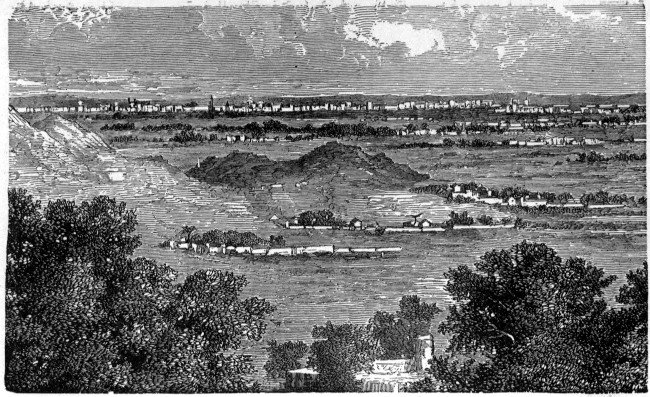MADAME DE BOURBOULON.
We must not omit from our chronicle of female travellers the name of Madame Catherine de Bourboulon. Of her biography we know no more than that, a Scotchwoman by birth, she married a French diplomatist, who, in 1860, was serving the State as French ambassador to the Court of Pekin.
In the month of August, 1860, she was temporarily residing at Shanghai. It would be interesting to know what the Chinese people thought of this handsome and self-possessed lady; unaccustomed as they were and are to visits from European women, and unfamiliar as they were and are with the idea that a person of the grand monde in nowise compromises her dignity by travelling about as freely and walking as readily as servants and females of the lower classes. "To see ourselves as others see us" is always instructive and interesting; and a sketch of Madame de Bourboulon by the Chinese would not be less valuable than a sketch of the Chinese by Madame de Bourboulon.
[Pg 271]
Fortune had not been kind to Madame de Bourboulon in throwing her into Shanghai during the great Taïping conspiracy, and compelling her to be an eye-witness of the crimes which sullied it. Beneath her windows were carried every day the dead bodies of the poor creatures massacred by the Taïpings, and she followed with reluctant gaze these sad "waifs and strays" as the river conveyed them seawards.
Though her health was not good, she hastened, on the conclusion of peace, to follow her husband to Pekin. From Shanghai to the Gulf of Petchi-li, into which the Peiho empties its waters, the distance is two hundred leagues.
Our traveller embarked on board the steam despatch-boat Fi-lung, which was escorted by a man-of-war brig. On crossing the river-bar, she saw before her the celebrated Taku forts, and higher up the river the town of Pehtang, with immense plains of sorghum, maize, and millet spreading as far as the eye could see.
On the 12th of November she arrived at Tien-tsin. The French legation was established in a rich yamoun, which, under the presiding genius of Madame de Bourboulon, soon become the highly recherché centre of European society. There, Chinese art displayed all its marvels of design and workmanship; the colours of the rainbow glittered everywhere; the walls were emblazoned with pleasant landscapes, azure seas, transparent lakes, shadowy forests, an imperial hunting party, with antelopes and roebucks flying before the loud-mouthed hounds; in a word, with all the delights of a Chinese earthly paradise. But
[Pg 272]
Madame de Bourboulon did not confine herself to social pleasures; her heart and hand were ever ready for charitable labours, and the Chinese poor had ample occasion to acknowledge her beneficence. Among other works of mercy, she adopted a young orphan girl, of whom she says:—"My little companion eats well and sleeps well.
She is full of mirth, and seems neither to remember nor to care for the terrible catastrophe which separated her from her parents, massacred at the capture of Pehtang. Her feet are not yet completely deformed; however, when we remove the bandages which compress them, she does not forget to replace them at night. It is not only in China

that coquetry or fashion stimulates its victims to torture and disfigure God's handiwork: the unnaturally small feet of the Chinese women are at least not more injurious or unsightly than the unnaturally small waists of the ladies of Europe!"
What the Chinese think of their women may be inferred from a characteristic incident, of which Madame de Bourboulon is the narrator.
The cook of the embassy, Ky-tsin, was a man with more years than gallantry. One day he went to see his wives and children, who resided at some distance; on his return, Madame de Bourboulon put some questions to him respecting his family. "The wives," he replied, in his bad French, and with an air of sovereign contempt, " pas bon, pas bon, bambou, bambou! " The stick seems to be the only, or at least the favourite, argument of the Chinese in their dealings with the other sex; and in this contempt for women we shall probably find the cause of the moral rottenness of the Celestial Empire.




